Deathwatch: Best RPG… Ever!
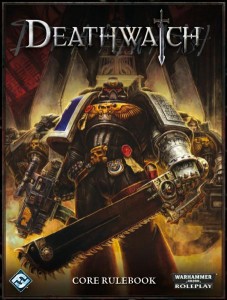 I’ve enjoyed a lot of different games over the years. However, Deathwatch (the newest RPG from Fantasy Flight Games), has taken its place as my favorite roleplaying game of all time. You heard right, all-time favorite. For those of you unfamiliar with the basic concepts of the game, you can click here for a brief overview from FFG.
I’ve enjoyed a lot of different games over the years. However, Deathwatch (the newest RPG from Fantasy Flight Games), has taken its place as my favorite roleplaying game of all time. You heard right, all-time favorite. For those of you unfamiliar with the basic concepts of the game, you can click here for a brief overview from FFG.
Deathwatch is the third RPG from FFG set in Games Workshop’s Warhammer 40,000 universe. I enjoy the other two games immensely – Dark Heresy features players taking on the role of agents of the Inquisition, and Rogue Trader allows players to seek their own fortunes as explorers and merchant princes. In Deathwatch, players take on the role of Space Marines – genetically enhanced, super-human warriors, who have been assigned to the Deathwatch and are dedicated to protecting humanity from threats too powerful to be dealt with by more conventional methods.
There are several reasons why this game has managed to top my charts, but before addressing them I’ll share a quick caveat: these are my opinions and why Deathwatch is my favorite game. Here’s a little insight into the essential elements that I feel form the criteria on what makes a great RPG:
- A well-developed, multi-faceted setting.
- Characters with well-defined roles and a purpose within the setting.
- A strong focus on teamwork and cooperative play.
- Attention given to consequences and the cause-and-effect nature of the characters’ interactions with the setting and story.
- Focus placed on the players’ choices and actions.
- Rewards that go beyond the simple acquisition of “stuff.”
- An “epic” feel. I’m not necessarily talking about playing powerful characters, but playing characters whose actions matter to the story.
You’ll notice two things conspicuously absent from my list of game elements:
- Mechanics. So long as a game has easy-to-understand and internally consistent rules that don’t get in the way of telling a good story, I’m happy (and to me it’s very difficult to be superior to FATE for storytelling, though Deathwatch doesn’t use FATE).
- Roleplaying. I have always felt that the responsibility to provide good roleplaying is on the players and the GM. It’s not the game’s responsibility to do the roleplaying, although it shouldn’t get in the way of roleplaying either!
With that being said let’s look at the reasons why Deathwatch puts me in my gaming happy-place:
STYLE & SETTING
The Warhammer 40K setting has been around for nearly 30 years, and there are an incredible number of games (miniature, board, card, and electronic), novels, web-sites, and even an upcoming feature-length movie detailing the setting. In general, I’m inclined to not play a game with that much ancillary material in existence; “cannon” tends to ruin the enjoyment for me, making the game feel restrictive and repetitive. However, FFG has done a fantastic job of blending what the fans “know” of the setting with the creation of a local area (the Jericho Reach) for the game, full of details and hooks, all of which serve to inspire without restricting.
For those of you unfamiliar with the setting, it can be hard to describe easily. On the surface, it would be easy to think of Deathwatch as sci-fi, what with the spaceships, weapons, and aliens. However, the Imperium of Man is an ancient institution that relies more on faith and superstition than knowledge and technology. This gives the setting its heavy gothic feel with strong overtones of the supernatural and mysticism. To me, the Warhammer 40K setting is more accurately described as “sinister fantasy meets medieval horror set against a grim science fiction backdrop.” That’s kind of a mouthful for a genre, but the best I can do to capture the setting’s style, feel, and tone. Style and setting are two of the elements that make Deathwatch a superior game for me. Dark gothic fantasy trappings (aspects I invoke easily), blended with an oppressive and grim future just begging for heroes that might bring a flicker of light into the unending darkness.
Another element of style that speaks to me is the setting’s interesting dichotomy between moral absolutes and ambiguous shades of grey. Space Marines, and mankind as a whole, view the galaxy in absolute black and white – aliens are blatant threats to mankind’s divine right to rule the galaxy, heresy must be purged lest it corrupts the Imperium from within, and the demonic forces of Chaos lurk everywhere waiting to spread their evil taint. No extreme in service of the God-Emperor is too great in the protection of mankind from the myriad of threats lurking across the galaxy.
This mindset is clearly forged into the PC’s, as they are the ultimate defenders of humanity, literally built for it. For me as a GM this is a great opportunity to really illustrate to the players the consequences of their characters’ actions by placing them in complex situations where they must make major decisions that don’t have easy answers. Here are a few examples of the type of moral decisions that can frequently come into play in Deathwatch:
- Do you kill a world in order to protect the galaxy?
- Should a heretic be brought before justice or do you serve as judge, jury, and executioner?
- Not everyone’s priorities are the same, where do yours lie? To the Deathwatch? Your Space Marine Chapter? The Imperium? Maybe even to yourself?
- What do you do when faced with aliens who desire to serve the “greater good” and believe that sentient beings can live together in peace and work toward each others mutual aid?
- There’s a fine line between ignorance and heresy – can you tell the difference?
These are just a few examples of the kind of moral dramas that play out so very well in Deathwatch. For me, what makes these much more powerful than in other games is the default role in which the characters are defined. They are Space Marines. They are the greatest defenders humanity has ever known. They are the servants of the God-Emperor. They are the Deathwatch. What the characters are impacts every decision they make. However, what they are doesn’t necessarily offer any clear answers to the dilemmas they face. They must choose, and live with the consequences of their choices.
For me, there are a few other elements of style that really set Deathwatch apart from other RPG’s. I’m not suggesting that any of these aren’t present in other games, just that in Deathwatch they are moved to center stage and surpass such things as the quest for power or the acquisition of loot. To me some of the most interesting include:
- Duty
- Honor
- Courage
- Leadership
- Loyalty
In many games these concepts rarely come up. If they do, it’s most likely only relevant to one character and probably doesn’t impact the whole of the game. As Space Marines of the Deathwatch, all of these concepts are built into the characters by the very nature of who they are and their role within the setting. However the interesting thing to me is how these concepts will manifest for each individual character as well as for the Kill-Team as a whole. It is the way each player interprets and embodies these concepts that makes the game really take on depth and nuance. These are the details that make characters feel more three-dimensional than your typical RPG characters, ones that are forever embroiled in the “adventure to gain experience and stuff; go up in level and use stuff to go on adventures” cycle.
SCOPE & FORMAT
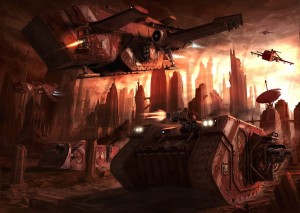 Deathwatch is a game that is epic in scale. Although the heroes’ actions will never be known by those they protect, their mission is among the most important in the galaxy. Entire worlds live or die based on the actions of the characters. But even with this kind of power and responsibility the heroes still struggle against a never-ending tide of unimaginable threats – hordes of enemies too numerous to count, vile fiends too horrible to contemplate, and threats that seek only to eradicate humanity from the galaxy. This kind of scope gives Deathwatch real weight and substance.
Deathwatch is a game that is epic in scale. Although the heroes’ actions will never be known by those they protect, their mission is among the most important in the galaxy. Entire worlds live or die based on the actions of the characters. But even with this kind of power and responsibility the heroes still struggle against a never-ending tide of unimaginable threats – hordes of enemies too numerous to count, vile fiends too horrible to contemplate, and threats that seek only to eradicate humanity from the galaxy. This kind of scope gives Deathwatch real weight and substance.
In addition to the nature of the setting and the roles the players take, Deathwatch achieves this level of epic scope through several means, many of which also appeal to my criteria for a superior RPG. These specific game elements and concepts include the following:
- Patronage: As Space Marines, the characters are members of a monastic warrior cult, the Deathwatch, and they serve the Imperium of Man by the grace of the God-Emperor. By the very nature of their role the characters are part of the Imperial war-machine. This gives the players purpose and patronage. However, as part of the super-elite Deathwatch the players have a great deal of autonomy and are free to carry out their missions as they see fit. In this way the game has found the perfect balance between duty with purpose, and freedom to make choices and act.
- Missions: By default, Deathwatch scenarios are organized into Missions. For me, the Mission format is fantastic. It gives the players a clear sense of purpose and well-defined goals, but doesn’t limit them in any way as to how they accomplish those goals. It also means that play tends to focus on making important choices and executing decisive actions. I’ve played in way too many games where the “adventure” is trying to figure out what the adventure is. This isn’t to say that Deathwatch puts everything on a silver platter for the players. Objectives can change, intelligence can be erroneous, and nothing ever goes as planned. Overall, the Mission format gives direction (in the form of Objectives), but allows for real decision making on the part of the players as to how, and which, Objectives to complete. As GM, I simply find the Mission format easy to work with and design for.
- Leadership: The idea of PC leadership is one that many RPG’s intentionally shy away from – not so in Deathwatch. Every mission that a Kill-Team is sent on will have a designated leader. The team leader is the one who is ultimately responsible for the success or failure of the mission (at least in the eyes of the team’s commander), and is responsible for making decisions when the team can’t reach a consensus. The choice of team leader also impacts Cohesion (see below) and dictates which Oaths a team can take before a mission. Oaths grant the team special abilities for the duration of the mission. Every single character will have something different to offer if they are team leader, so it becomes an important decision on the part of the players as to who will lead any given mission. What I love about this is that it allows the “leadership baton” to be passed around from mission to mission. It’s great to see that normally reserved, quiet player come out of their shell when they have to step up and take command of the Emperor’s finest!
- Renown & Requisition: Most RPG’s put an emphasis on the acquisition of treasure and loot. To me, this can sometimes cheapen the feel of the game. Space Marines are far beyond such petty needs as piles of gold or magical trinkets. In Deathwatch, the primary reward for successfully completing a mission (besides mere survival) is Renown. Renown is a point-based measure of the character’s success, reputation, and accomplishment. Although irrelevant to those outside the Deathwatch, Renown comes into play through the nature of the game’s Requisition aspect. Space Marines are always assumed to have the basic gear that is necessary for their specialty (power armor, bolter, etc.). In addition, at the start of a mission, after the initial briefing, players can “purchase” additional equipment based on their perceived needs for mission success. What they can have is based on Renown and Requisition. Requisition is a point “budget” given to each player based on how difficult the mission is thought to be. Each player may “buy” additional equipment with these points. However, all items have a minimum Renown level that the character must meet in order to be trusted with the item in question. I’ve found that this system lends itself to interesting encounters with the Deathwatch arms-master and the players seem to really enjoy the tactical aspect of selecting a limited amount of gear to accomplish their mission, especially since these decisions may be based on faulty intelligence (not that I’d do that to my players!).
- Solo Mode & Squad Mode: One of the more interesting aspects of Deathwatch is the inclusion of two “modes” of operation: Solo Mode & Squad Mode. Solo Mode is the default mode for each character and conceptually works just like every other RPG out there. This is the mode where players take actions and do stuff as individuals. Squad Mode (on the other hand) is a very different beast. When the characters meet the conditions to be in Squad Mode, their abilities and options available are greatly increased – they can support and defend squad mates better, and become a more effective combat unit. In Squad Mode, Space Marines really shine, and their legendary combat prowess becomes obvious. However, the ability to retain Squad Mode is dictated by Cohesion. It takes a strong leader and players who focus on teamwork to make the most of Squad Mode, which is another one of the reasons why Deathwatch is in my number-one RPG spot.
All of these things contribute heavily to my criteria for Deathwatch being not only a great game, but my all-time favorite RPG – and this game has it in spades! For some, this game may be easy to dismiss as a combat heavy, hack-and-slash gore-fest with little room for “real roleplaying,” but don’t be fooled, it’s anything but. Deathwatch will surprise you with its depth, its complexity, and its ability to bring out the best in your players as they adopt to roles they may not be used to. It’s exciting to see the party “tank” deal with the consequences of his actions, or the quiet girl at the table thrust into the spotlight as team leader, or the “over-thinker” forced to take action.
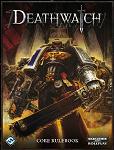 If you’re looking for a game with action, excitement, intensity, and the potential to invoke some serious dramatic roleplaying, look no further than Deathwatch.
If you’re looking for a game with action, excitement, intensity, and the potential to invoke some serious dramatic roleplaying, look no further than Deathwatch.
If this game sounds like it would be fun, you can get it here, or download here.

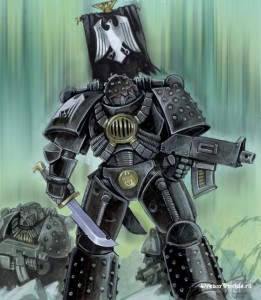
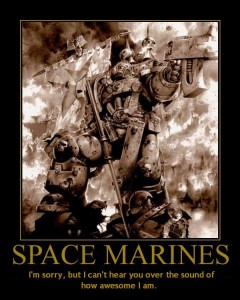
Do you know of any supplements that may be planned?
According to FFG:
Deathwatch Core Rules [out now]
Game Master’s Kit [out now; includes adventure and GM screen]
The Emperor Protects [winter 2010; a trilogy of linked missions]
Rites of Battle [late winter; expanded vehicles and equipment, more detail on the Deathwatch]
Mark of the Xenos [spring 2011; creature book]
The Achilus Crusade [spring 2011; an expanded look at the setting]
So far that looks like it for the next 6 months or so.
John, I don’t know if Deathwatch is my all-time favorite, but it surely is somewhere in the top three for me.
I especially like how when I go over the book a second time, and then a third, I continue to find things that surprise and impress me. I’m definitely looking forward to more Deathwatch.
You make a compelling case with your list of game mechanics, and I like them all (especially the rewards and epic points), but my favorite has to be teamwork and cooperative play. That definitely rings my bell.
The setting sounds immediately engaging, and one I’d like to play inside. I think I tend towards fantasy more readily than science fiction, mostly because of fantasy’s free-form nature vs. science fiction’s rigid structure, but this preference doesn’t appear to be an obstacle for Deathwatch. And by the way, I’m always in for a good horror setting. Yum. And the grey morality appeals also. I like being confronted with tough decisions in games, because I can agonize over them without ever really putting anything at risk. You know, as opposed to real life.
Hey now, I like how the game reinforces leadership with actual game impact. What a great way to do it. And that Renown system looks like it can be adapted for other games. I’m specifically thinking of D&D and the weight of all that pretend gold.
An excellent review, meaty and interesting and passionate. Thanks for the write up!
@Dixon: I’m like you, I rarely play in sci-fi games or any non-fantasy for that matter. But this setting has always been among my favorites due to the overwhelming fantasy/gothic/horror vibe. For me this makes the setting very accessable.